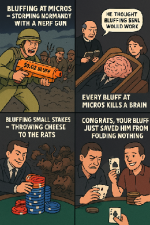I
ihuoiouio
Rising Star
Bronze Level
Balancing bluff Frequency in Low-Stakes Games
I’ve been thinking a lot about how often we should actually be bluffing in low-stakes cash games, especially since many players at these tables tend to call more often than they fold. From my experience, trying to maintain a balanced bluff-to-value ratio doesn’t always seem optimal when the average opponent isn’t paying attention to balance in the first place.
Do you think it’s more profitable to significantly reduce bluffs against “calling stations” and focus on value betting, or should we still keep some bluffs in our range to avoid becoming too predictable? I’d love to hear how others approach this, particularly when moving between low-stakes and mid-stakes games where player tendencies shift.
How do you personally adjust your bluff frequency based on the player pool you’re up against?
I’ve been thinking a lot about how often we should actually be bluffing in low-stakes cash games, especially since many players at these tables tend to call more often than they fold. From my experience, trying to maintain a balanced bluff-to-value ratio doesn’t always seem optimal when the average opponent isn’t paying attention to balance in the first place.
Do you think it’s more profitable to significantly reduce bluffs against “calling stations” and focus on value betting, or should we still keep some bluffs in our range to avoid becoming too predictable? I’d love to hear how others approach this, particularly when moving between low-stakes and mid-stakes games where player tendencies shift.
How do you personally adjust your bluff frequency based on the player pool you’re up against?
Last edited:

















